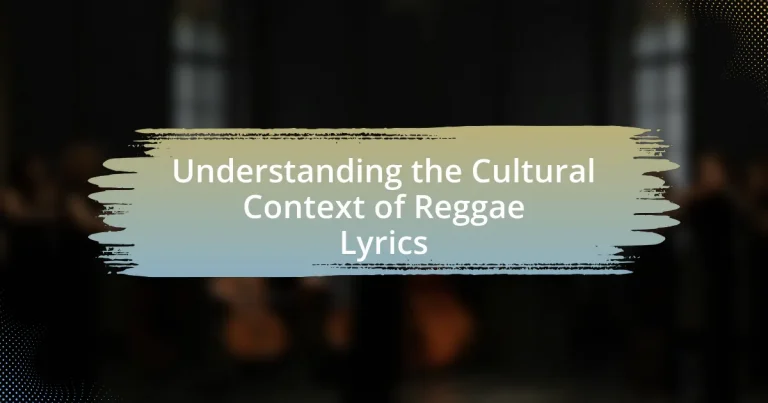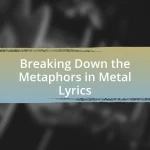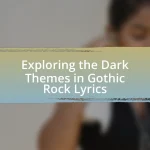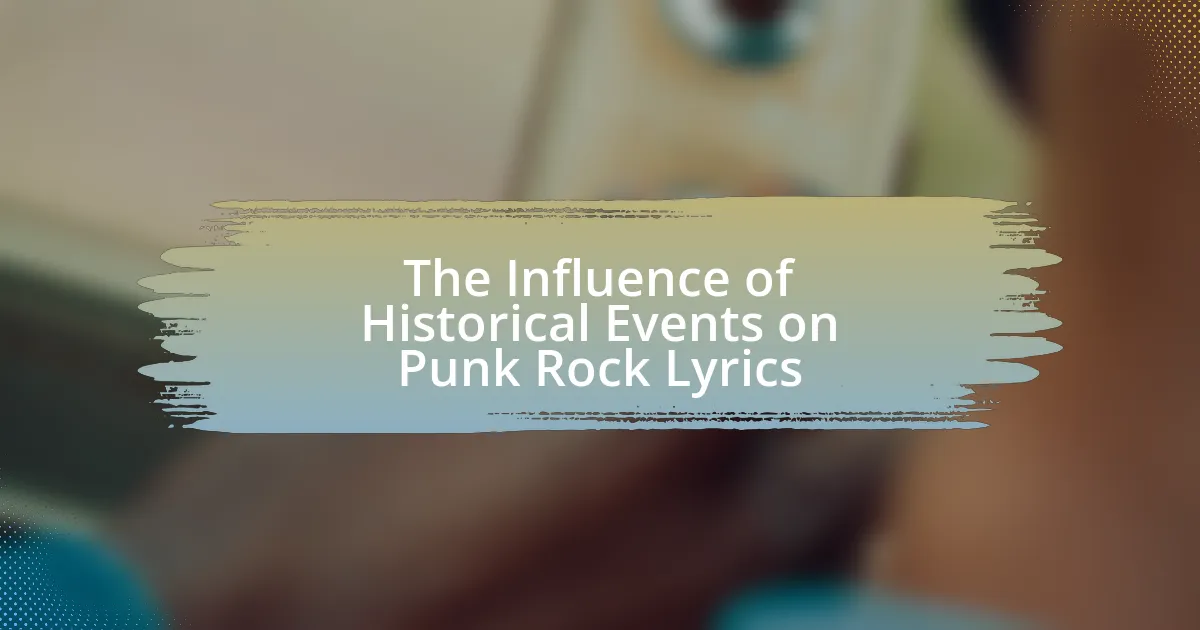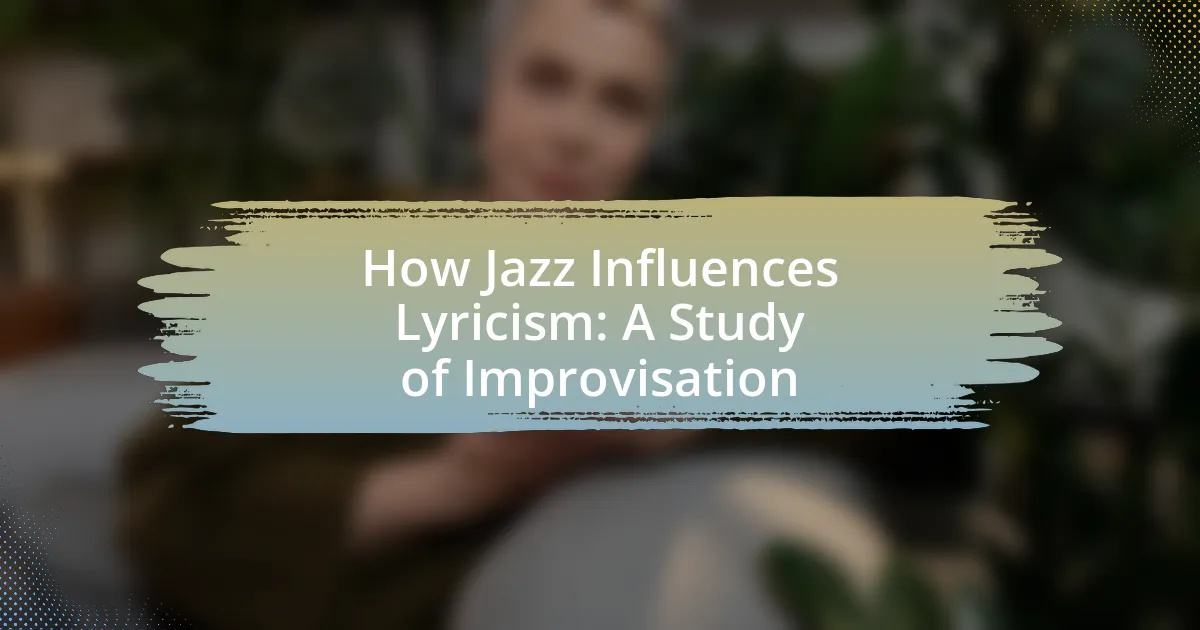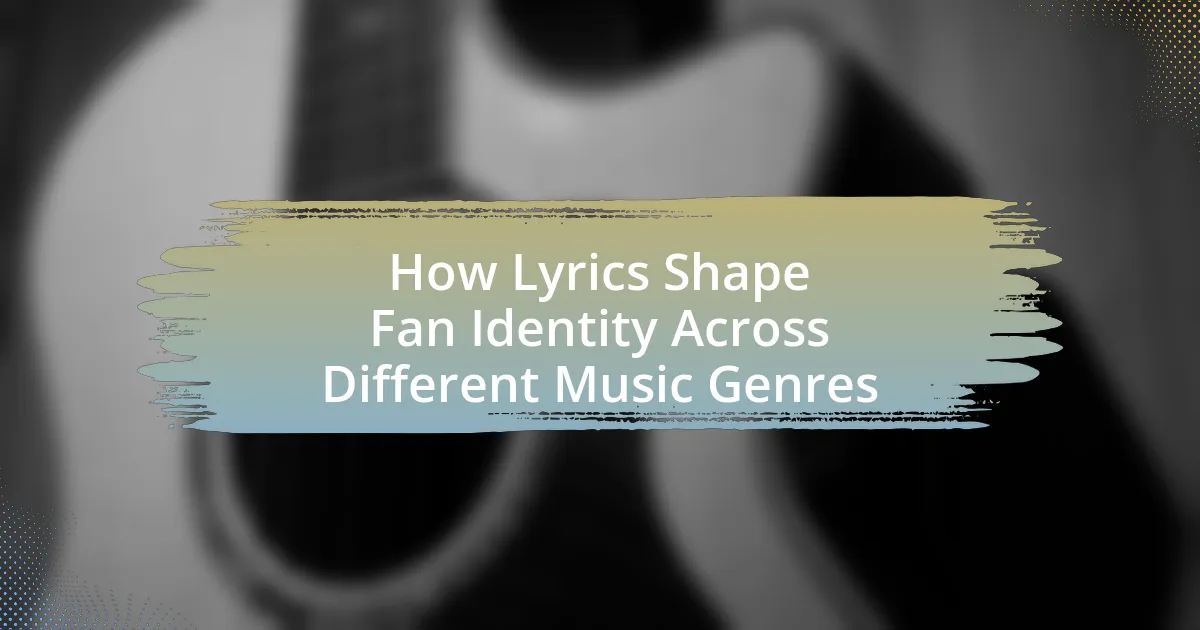The article focuses on understanding the cultural context of reggae lyrics, emphasizing their roots in Jamaica’s social, political, and economic struggles, particularly during the 1960s and 1970s. It explores how historical events, such as colonialism and the Rastafarian movement, shape the themes of resistance, social justice, and identity found in reggae music. Additionally, the article examines the influence of local traditions, linguistic features, and artistic elements that contribute to the genre’s unique expression of cultural identity and social commentary. Key themes include the role of spirituality, the impact of social movements, and the use of narrative storytelling in conveying messages about poverty, inequality, and empowerment.
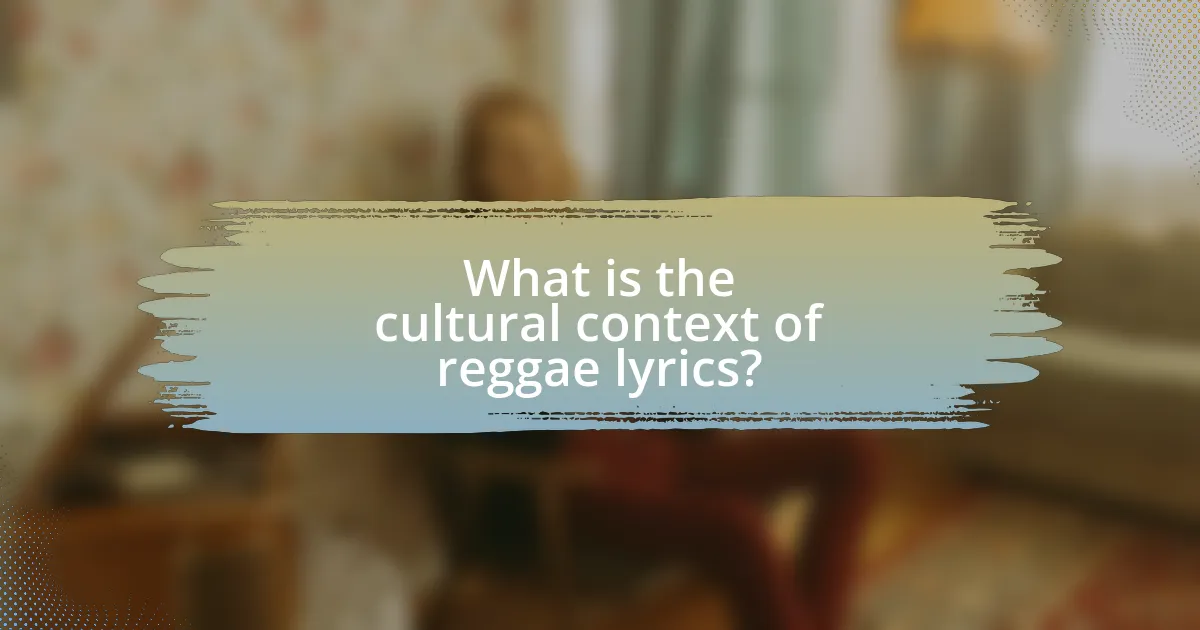
What is the cultural context of reggae lyrics?
The cultural context of reggae lyrics is deeply rooted in the social, political, and economic struggles of Jamaica, particularly during the 1960s and 1970s. Reggae music emerged as a voice for the marginalized, addressing issues such as poverty, inequality, and resistance against colonialism. The Rastafarian movement significantly influenced reggae, promoting themes of spirituality, identity, and social justice, which are prevalent in the lyrics. For example, songs often reference the struggles against oppression and the quest for freedom, reflecting the historical context of Jamaican society, including the impact of British colonial rule and the fight for civil rights. This connection to cultural identity and social issues makes reggae lyrics a powerful medium for expressing the collective experiences and aspirations of the Jamaican people.
How do historical events influence reggae lyrics?
Historical events significantly influence reggae lyrics by providing context and themes that resonate with the struggles and aspirations of the Jamaican people. For instance, the impact of colonialism, social injustice, and political turmoil in Jamaica has led artists to address issues such as poverty, resistance, and identity in their music. The 1970s political violence and the rise of Rastafarianism, which emerged as a response to oppression, are reflected in songs that advocate for social change and unity. Additionally, events like the assassination of political leaders and the influence of the civil rights movement in the United States have inspired reggae artists to incorporate messages of empowerment and resistance against systemic oppression. These historical contexts shape the lyrical content, making reggae a powerful medium for social commentary and cultural expression.
What specific events shaped the themes in reggae music?
The themes in reggae music were shaped by specific events such as the Rastafarian movement, the social and political struggles in Jamaica, and the influence of colonialism. The Rastafarian movement, which emerged in the 1930s, emphasized themes of resistance, identity, and spirituality, significantly influencing reggae lyrics. The social and political struggles, including poverty, violence, and inequality in Jamaica, provided a backdrop for artists to express their frustrations and hopes through music. Additionally, the impact of colonialism and the fight for independence in the 1960s and 1970s further infused reggae with themes of liberation and social justice, as seen in the works of artists like Bob Marley, whose songs often addressed these issues directly.
How do social movements reflect in reggae lyrics?
Social movements are prominently reflected in reggae lyrics through themes of resistance, social justice, and empowerment. Reggae music, originating in Jamaica during the late 1960s, often addresses issues such as poverty, inequality, and political oppression, mirroring the struggles faced by marginalized communities. For instance, artists like Bob Marley and Peter Tosh used their music to advocate for civil rights and anti-colonial sentiments, with songs like “Get Up, Stand Up” and “Equal Rights” explicitly calling for action against injustice. The lyrics serve as a vehicle for expressing collective grievances and aspirations, reinforcing the connection between the music and the socio-political landscape of the time.
What role does Jamaican culture play in reggae lyrics?
Jamaican culture plays a fundamental role in reggae lyrics by providing the thematic and contextual foundation that reflects the island’s social, political, and spiritual experiences. Reggae lyrics often address issues such as poverty, resistance to oppression, and the celebration of Rastafarian beliefs, which are deeply rooted in Jamaican history and identity. For instance, the lyrics of Bob Marley, a prominent reggae artist, frequently highlight themes of social justice and unity, drawing from the struggles faced by Jamaicans during colonialism and the fight for civil rights. This cultural backdrop not only informs the content of reggae music but also resonates with listeners, making it a powerful medium for expressing the collective consciousness of Jamaican society.
How do local traditions and beliefs manifest in reggae music?
Local traditions and beliefs manifest in reggae music through lyrical themes, instrumentation, and cultural symbols that reflect Jamaican heritage. Reggae often incorporates Rastafarian beliefs, emphasizing spirituality, social justice, and resistance against oppression, which are evident in songs by artists like Bob Marley, whose lyrics frequently address themes of unity and empowerment. Additionally, traditional Jamaican musical elements, such as the use of the one drop rhythm and offbeat guitar strumming, create a distinct sound that is rooted in the island’s cultural practices. The incorporation of local dialects and proverbs in lyrics further illustrates the connection to Jamaican identity and communal values, reinforcing the music’s role as a vehicle for cultural expression and social commentary.
What are the linguistic features unique to reggae lyrics?
Reggae lyrics exhibit unique linguistic features such as the use of Jamaican Patois, a distinct dialect that incorporates English, African languages, and elements from Spanish and Portuguese. This linguistic choice reflects the cultural identity and social issues prevalent in Jamaican society. Additionally, reggae lyrics often employ a rhythmic and repetitive structure, enhancing their musicality and making them memorable. The themes frequently address social justice, love, and resistance, which are articulated through vivid imagery and metaphors. These features not only convey messages but also resonate with the experiences of marginalized communities, reinforcing the genre’s roots in activism and cultural expression.
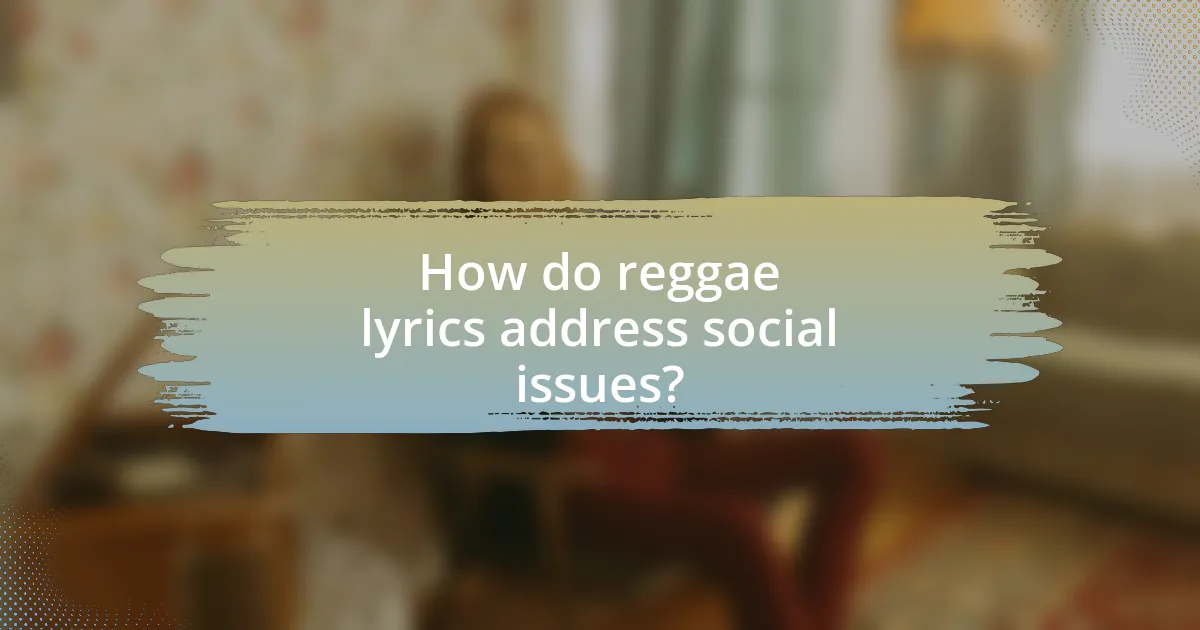
How do reggae lyrics address social issues?
Reggae lyrics address social issues by highlighting themes of resistance, inequality, and social justice. Artists like Bob Marley and Peter Tosh use their music to critique systemic oppression, advocate for human rights, and promote unity among marginalized communities. For instance, Marley’s song “Get Up, Stand Up” calls for action against injustice, while Tosh’s “Equal Rights” explicitly demands equal treatment for all individuals, regardless of race or background. These lyrics often reflect the socio-political climate of Jamaica, particularly during the 1970s and 1980s, when issues such as poverty, violence, and political corruption were prevalent. The incorporation of Rastafarian beliefs further emphasizes the struggle against oppression and the quest for liberation, making reggae a powerful medium for social commentary.
What common social themes are found in reggae lyrics?
Common social themes found in reggae lyrics include resistance to oppression, social justice, love, and unity. Reggae often addresses issues such as poverty, inequality, and political struggles, reflecting the socio-political landscape of Jamaica and the broader African diaspora. For instance, artists like Bob Marley have famously highlighted themes of resistance against colonialism and systemic injustice, as seen in songs like “Get Up, Stand Up.” Additionally, the emphasis on love and community is prevalent, promoting messages of togetherness and harmony, which are central to the Rastafarian movement that heavily influences reggae music.
How do reggae artists express resistance through their lyrics?
Reggae artists express resistance through their lyrics by addressing social injustices, political oppression, and economic inequality. These artists often use their music as a platform to highlight the struggles faced by marginalized communities, drawing on historical contexts such as colonialism and systemic racism. For example, songs like “Get Up, Stand Up” by Bob Marley advocate for fighting against oppression and demand social change, reflecting the Rastafarian movement’s emphasis on resistance. Additionally, lyrics often incorporate themes of empowerment and unity, encouraging listeners to stand against injustices and seek liberation. This lyrical resistance is rooted in the cultural and historical experiences of the Jamaican people, making reggae a powerful medium for social commentary and activism.
What messages about poverty and inequality are conveyed in reggae music?
Reggae music conveys strong messages about poverty and inequality, often highlighting the struggles faced by marginalized communities. Artists like Bob Marley and Peter Tosh address social injustices, economic disparity, and the impact of colonialism on the lives of the oppressed. For instance, Marley’s song “Get Up, Stand Up” calls for resistance against oppression, emphasizing the need for empowerment among the impoverished. Additionally, Tosh’s “Equal Rights” explicitly demands justice and equality, reflecting the deep-rooted issues of systemic inequality. These themes resonate throughout reggae, serving as a voice for the voiceless and advocating for social change.
Why is spirituality significant in reggae lyrics?
Spirituality is significant in reggae lyrics because it serves as a foundational element that reflects the genre’s roots in Rastafarian beliefs and broader cultural expressions. Reggae music often addresses themes of faith, social justice, and the quest for a deeper connection with the divine, which resonates with listeners seeking meaning and solace. For instance, artists like Bob Marley frequently incorporated spiritual messages in songs such as “One Love” and “Redemption Song,” emphasizing unity and liberation through a spiritual lens. This integration of spirituality not only enriches the lyrical content but also connects the music to the historical struggles and aspirations of the Jamaican people, reinforcing reggae’s role as a voice for the marginalized and a medium for spiritual awakening.
How do Rastafarian beliefs influence the content of reggae songs?
Rastafarian beliefs significantly influence the content of reggae songs by embedding themes of social justice, spirituality, and resistance against oppression. Reggae music often reflects the Rastafarian emphasis on the struggles of the African diaspora, promoting messages of unity, empowerment, and the importance of returning to Africa, particularly Ethiopia, which is viewed as a spiritual homeland. For instance, songs by artists like Bob Marley frequently address issues such as poverty, inequality, and the fight against colonialism, illustrating the Rastafarian commitment to advocating for the marginalized. This connection is evident in tracks like “Get Up, Stand Up,” which calls for social action and highlights the Rastafarian belief in standing against injustice.
What role does faith play in the storytelling of reggae music?
Faith serves as a foundational element in the storytelling of reggae music, often reflecting themes of spirituality, resilience, and social justice. Reggae lyrics frequently draw upon religious beliefs, particularly Rastafarianism, which emphasizes a connection to God and the importance of faith in overcoming adversity. For instance, songs by artists like Bob Marley convey messages of hope and divine guidance, illustrating how faith can inspire individuals to persevere through struggles. This connection between faith and storytelling in reggae not only enriches the narrative but also resonates with listeners who seek solace and empowerment through music.
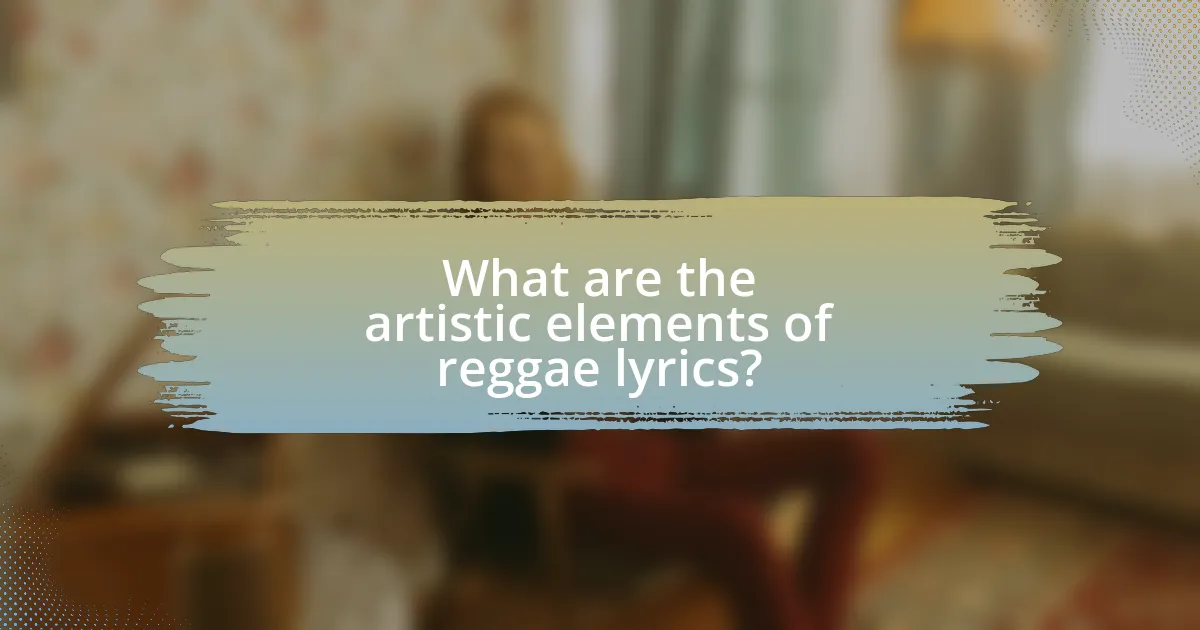
What are the artistic elements of reggae lyrics?
The artistic elements of reggae lyrics include themes of social justice, spirituality, love, and resistance. Reggae lyrics often reflect the struggles and aspirations of marginalized communities, emphasizing messages of empowerment and unity. The use of vivid imagery and metaphor is prevalent, allowing for deep emotional resonance. Additionally, the incorporation of Jamaican Patois adds authenticity and cultural specificity, enhancing the lyrical impact. Historical context, such as the influence of Rastafarian beliefs, further enriches the themes present in reggae music, making it a powerful medium for cultural expression and social commentary.
How do rhythm and rhyme contribute to reggae lyrics?
Rhythm and rhyme are fundamental elements that enhance the expressiveness and memorability of reggae lyrics. The syncopated rhythms typical of reggae music create a distinctive groove that encourages listeners to engage with the lyrics, making them more impactful. Additionally, the use of rhyme schemes in reggae lyrics fosters a lyrical flow that complements the music, allowing for easier recall and connection to the themes being presented. For instance, the repetitive nature of rhyme in songs by artists like Bob Marley reinforces messages of social justice and unity, making them resonate deeply within the cultural context of reggae. This combination of rhythm and rhyme not only enriches the listening experience but also serves to communicate complex ideas in a relatable manner, reflecting the genre’s roots in oral traditions and community storytelling.
What are the common poetic devices used in reggae music?
Common poetic devices used in reggae music include imagery, metaphor, simile, alliteration, and repetition. Imagery creates vivid pictures in the listener’s mind, enhancing emotional connection. Metaphors and similes draw comparisons that deepen meaning, often relating to social and political themes prevalent in reggae. Alliteration adds rhythm and musicality, while repetition emphasizes key messages, making them memorable. These devices collectively contribute to the storytelling and cultural expression found in reggae lyrics, reflecting the genre’s roots in social commentary and personal experiences.
How does the musicality of reggae enhance its lyrical messages?
The musicality of reggae enhances its lyrical messages by creating a rhythmic and melodic framework that amplifies emotional expression and cultural storytelling. The distinctive offbeat guitar strumming, known as the “one drop” rhythm, allows lyrics to resonate more deeply with listeners, making themes of resistance, love, and social justice more impactful. For instance, songs like Bob Marley’s “Redemption Song” utilize this musicality to convey powerful messages about freedom and empowerment, effectively engaging audiences both intellectually and emotionally. This synergy between rhythm and lyrics is a hallmark of reggae, reinforcing the genre’s role as a vehicle for cultural identity and social commentary.
What are the different styles of reggae lyrics?
Reggae lyrics exhibit various styles, primarily categorized into roots reggae, dancehall, and dub. Roots reggae focuses on themes of social justice, spirituality, and resistance, often reflecting Rastafarian beliefs, as seen in the works of Bob Marley and Peter Tosh. Dancehall lyrics, characterized by their upbeat tempo and party themes, often address love, relationships, and social issues, with artists like Shabba Ranks and Vybz Kartel exemplifying this style. Dub, on the other hand, emphasizes instrumental versions of reggae tracks, featuring echo and reverb effects, and often includes vocal snippets that convey messages of peace and unity. Each style serves to express the cultural and social realities of Jamaican life, making reggae a powerful medium for storytelling and commentary.
How do love songs differ from protest songs in reggae?
Love songs in reggae primarily focus on romantic relationships and emotional expressions, while protest songs address social and political issues, advocating for change and justice. Love songs often feature themes of affection, longing, and personal connection, using melodic and soothing rhythms to evoke feelings of intimacy. In contrast, protest songs utilize powerful lyrics and assertive beats to convey messages of resistance against oppression, inequality, and injustice, often drawing on historical contexts such as colonialism and civil rights movements. For example, Bob Marley’s “One Love” promotes unity and peace, while “Get Up, Stand Up” calls for action against systemic injustices, highlighting the distinct purposes and emotional tones of each genre within reggae music.
What are the characteristics of narrative storytelling in reggae lyrics?
Narrative storytelling in reggae lyrics is characterized by vivid imagery, social commentary, and personal experiences. Reggae lyrics often depict real-life situations, addressing themes such as love, struggle, resistance, and social justice, which resonate with the listener’s experiences. The use of storytelling techniques, such as character development and plot progression, allows artists to convey messages about the struggles of marginalized communities, often reflecting historical contexts like colonialism and oppression. For example, songs by artists like Bob Marley and Peter Tosh illustrate these characteristics by narrating personal and collective experiences that highlight the socio-political landscape of Jamaica.
How can one analyze reggae lyrics effectively?
To analyze reggae lyrics effectively, one should focus on the cultural, historical, and social contexts that shape the music. Reggae often addresses themes such as resistance, identity, and social justice, reflecting the experiences of marginalized communities, particularly in Jamaica. Understanding the socio-political background, such as the impact of colonialism and the Rastafarian movement, provides insight into the lyrics’ meanings. For instance, songs by Bob Marley often incorporate elements of spirituality and social commentary, which can be better understood by examining the historical struggles faced by the Jamaican people. Analyzing the use of metaphor, imagery, and rhythm in the lyrics also enhances comprehension, as these elements are integral to reggae’s expressive style.
What are practical tips for understanding the cultural context of reggae lyrics?
To understand the cultural context of reggae lyrics, immerse yourself in Jamaican history and social issues, as reggae often reflects the struggles and aspirations of the Jamaican people. Engaging with the Rastafarian movement is crucial, as many reggae songs incorporate its beliefs and symbols, which are rooted in the African diaspora and resistance to oppression. Listening to the music while reading the lyrics enhances comprehension, allowing for a deeper appreciation of the themes of love, spirituality, and social justice prevalent in the genre. Additionally, exploring interviews and documentaries featuring reggae artists can provide insights into their motivations and the societal influences shaping their work.
